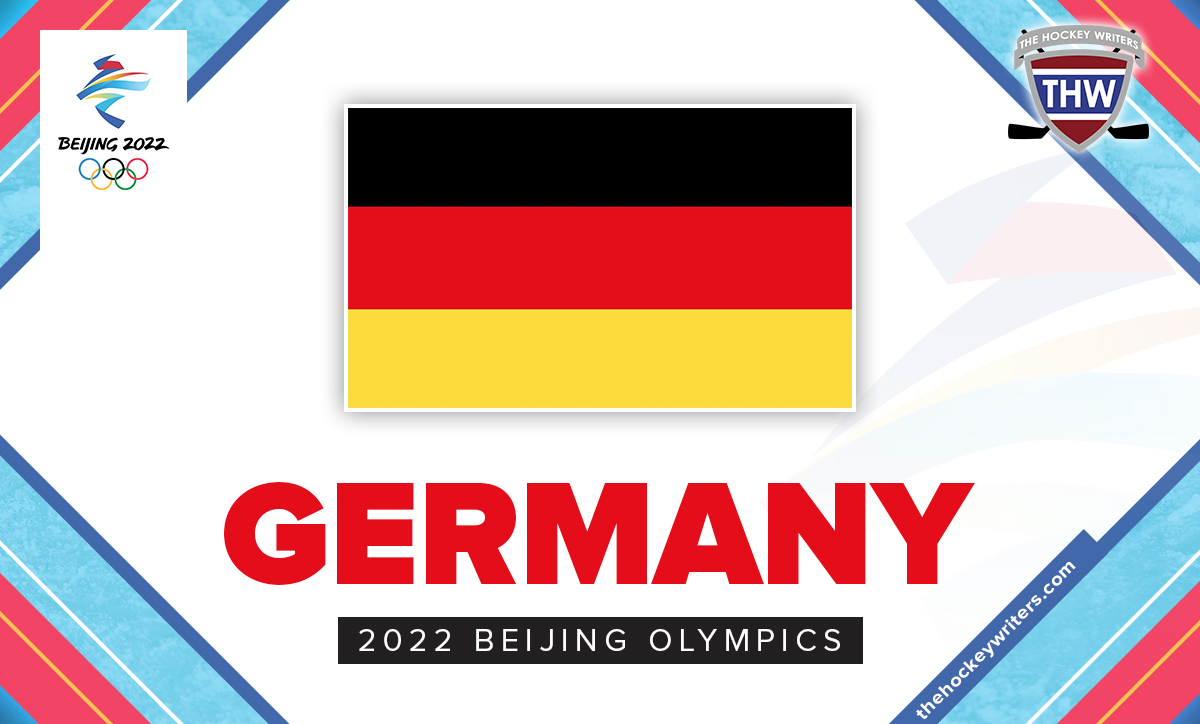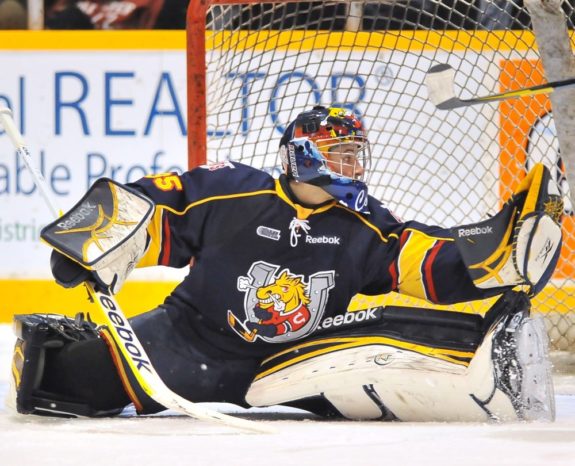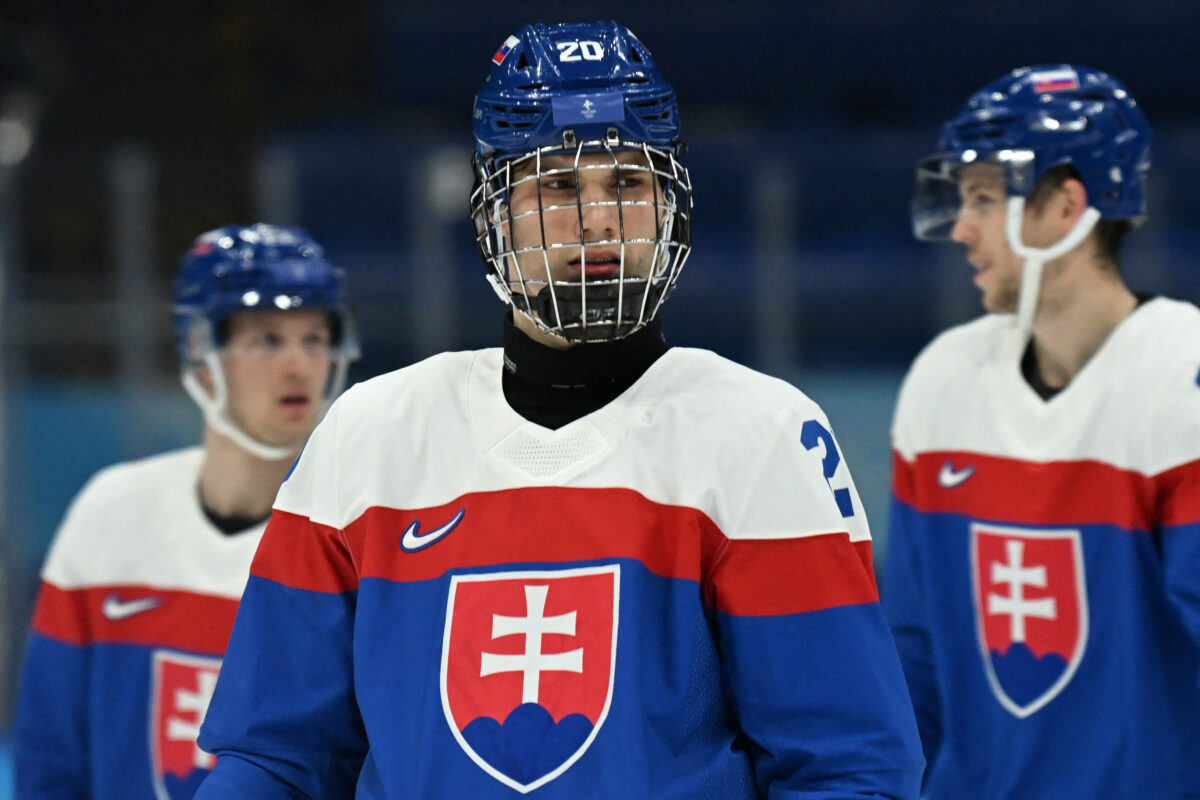On Monday night, Team Germany failed to re-capture their magic from a 2018 Olympic run that saw them win the silver medal. Despite a late-game push to even the score, Germany fell short, losing 4-0 to Slovakia. Entering the game, Slovakia and Germany held identical group stage records at 1-2-0, although Slovakia had a slight edge in goals for at 8-6, but trailed Germany in goals against at 12-10. Forward Libor Hudacek opened up the scoring in the first period, and Peter Cehlarik and Michal Kristof added a goal in the middle frame, as the Slovakian team proved to be too much for Germany. They’ll continue their journey for a medal against Team USA on Tuesday.
It was a disappointing end to what should have been a second consecutive run at a medal finish. However, a rematch against the Americans would have been a tall task, considering their 3-2 loss in the last game of group stage play. Matthias Niederberger was back between the pipes after conceding the goal to Danny aus den Birken in the last round-robin game.
A key task for the Germans was improving their scoring, which looked promising late into the group stage but never lived up to expectations. Head coach Toni Söderholm’s style, a defensive-minded and consistent mantra, was on full display with suffocating neutral-zone play and emphasizing shot-blocking and physicality. Still, their failure to register a goal was their undoing.

With their tournament wrapped up, the German team will go home without a medal for the 16th time in the country’s history. It will likely be the final tournament for players like aus den Birken (36), Korbinian Holzer (33), and Patrick Hager (33), who will all be in their mid-30s or early-40s by the time the 2026 Olympic Winter Games take place. As we say goodbye to Team Germany in the men’s hockey tournament, we look at their final three takeaways.
Slow Start for Germany
Coming in as the slightly-favored team as bronze-medalists, Germany started on the wrong foot. Credit to Slovakia, who brought their best efforts into the first period, playing a tremendous 200-foot game. Germany struggled with puck possession, often finding themselves covered by two Slovak players and turning the puck over in the neutral zone. Halfway through the period, Germany was outshot 5-1, with their only shot coming from Nicolas Krammer on a breakaway. Hudacek opened up the scoring for Slovakia after his shot deflected off German defenseman Jonas Müller, fooling Niederberger and beating him on the sixth shot of the period.
Related: Slovakia’s Slafkovsky is Ready for Playoff Clash with Germany
Germany mustered just four shots on net in the opening period compared to Slovakia’s nine. While they had some good looks, including two breakaways, they often found themselves looking for the perfect play and over-passing the puck on a few occasions. In the late stages of the opening period, Slovakia’s game came into full effect, as they held Germany within the confines of the neutral zone and swarmed anyone carrying the puck. By the time the game had reached the midway point, Slovakia had put the score out of reach with three unanswered goals.
Back to Niederberger
Back between the pipes, Niederberger got pelted with shots throughout the game. Slovakia got power-play time late in the first period after David Wolf got called for tripping, and they wasted no time setting up in the offensive zone and firing pucks at the German net. Early on, Niederberger appeared up to the task, making save after save while helping his team kill off the first two power plays. His rebound control was questionable, often kicking out picks into the high slot, but the German defense was positionally sound and cleared the puck out of danger.

The decision raised some concerns, as Niederberger appeared shaky in his two starts against Canada and China, while aus den Birken had a strong showing against the United States. It’s not to say Niederberger was to blame for the loss; he did keep his team in it while they were heavily outshot, but his flaws were exposed in the loss. The Slovak forwards got Niederberger moving side-to-side on several occasions, exposing his lack of a quick step. After conceding two goals in less than two minutes, the 29-year-old appeared shaken, and the German bench deflated.
Perhaps an eye-opening experience for Niederberger, it won’t be an experience he forgets. He’ll be 33 by the time the 2026 Olympics roll around, and he’ll get another shot at redemption when Germany announces their roster. Given that aus den Birken will be 41 by then, Niederberger will likely be counted as one of the country’s top goaltenders.
Penalty Troubles Once Again
Despite remaining relatively disciplined compared to their round-robin play, Germany still managed to find a way to take a few penalties that hurt their chances. Already outshot and out-played in the first period, Wolf’s late-period penalty allowed Slovakia to unload shots on Niederberger. In the second period, a poor line change caught the eye of the linesman, who swiftly called a too many men penalty against Germany. The bigger outlier was when Germany got their chance on the power play after Matthias Plachta took a high stick from Mislav Rosandic, only to see Plachta take a tripping penalty 18 seconds later after turning the puck over in the defensive zone.

While Germany looked more disciplined with their sticks and physical play, the timing of the penalties cost them any chance of building momentum. Slovakia’s drive, suffocating two-way play, and their ability to be all over the ice put Germany on the edge. Despite their composure, Germany could not find an answer at any point during the contest. The frustration showed both on the ice and the bench, as every opportunity to drive puck possession was met with a Slovak player or two to snuff out offense and drive the play the other way. By the end of the period, Germany unraveled when Wolf received a five-minute penalty for fighting and a game misconduct.
For Söderholm, this becomes the worst showing as a head coach of Team Germany on any stage. Under his guidance, they finished sixth at the 2019 IIHF World Championship in Switzerland. They followed it up with a fourth-place finish at the 2021 IIHF World Championship in Latvia, missing out on a podium finish. While he got the most out of a defensive-minded team, the combination of shaky goaltending and an anemic offense led to Germany’s downfall. From a silver medal to a quarterfinal exit, Germany learned the hard way that a defensive system can only take you so far against a potent offense.